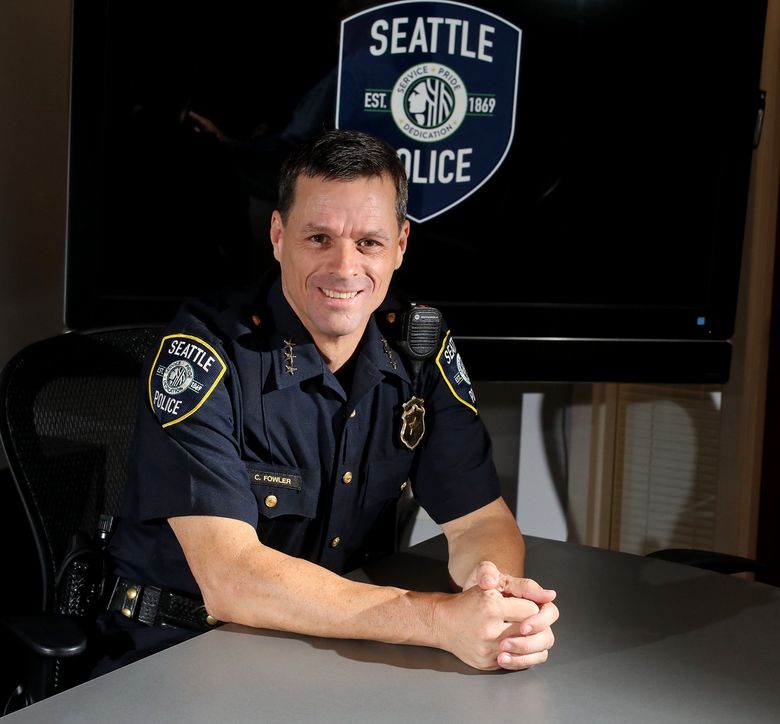
The man with the informal title of “Mister May Day” in the Seattle Police Department — because of his role overseeing the department’s response to the peaceful daytime march and evening mayhem — is retiring.
Chris Fowler, who over 26 years rose to the rank of deputy chief, the No. 2 position in the department, is leaving to become the deputy director of the Washington State Criminal Justice Training Commission.
The commission runs the training academy for police recruits from around Washington state, where Fowler, 53, will take his background in police reform and as a recently retired brigadier general in the Washington Army National Guard.
“Certainly the desire to innovate, to professionalize and really think about where policing is going in the 21st century, that was very appealing,” Fowler said in an interview Thursday.
Fowler will serve under Sue Rahr, the former King County sheriff who, after becoming executive director of the training commission in 2012, captured widespread attention when she shifted the academy’s approach from fashioning warriors in a military mold to training “guardians” of communities.
In 2014, Rahr was named to President Barack Obama’s Task Force on 21st Century Policing.
During the same period, Fowler played a key role in implementing federally mandated reforms in the Seattle Police Department after the U.S. Justice Department found in 2011 that officers had engaged in a “pattern or practice” of using excessive force and displayed troubling evidence of biased policing.
A federal judge found the department to be in full compliance with a consent decree in January, triggering a two-year review period to ensure the reforms are locked in place.
Fowler also worked with the community, prosecutors, public defenders and others in law enforcement in developing a national model known as the Law Enforcement Assisted Diversion (LEAD) program, which strives to divert low-level offenders addicted to drugs into treatment.
But he was most visible between 2013 and 2017 as the police commander who planned and carried out the department’s response to the May Day march to promote immigrants’ and workers’ rights and the separate acts of vandalism that erupted after dark.
After the department was heavily criticized for being ill-prepared when widespread vandalism occurred during May Day in 2012, Fowler, with his National Guard background, was handed the assignment of fixing the problem.
That translated to deploying waves of bike officers, setting off blast bombs loaded with powdered pepper spray and creating paths to disperse unruly crowds.
The tactics were generally seen as a success and the mayhem has dissipated in recent years; and police elsewhere have learned from Seattle, particularly in the use of bike officers.
“The basic philosophy was constitutionally protected speech, and so I think if you set that, which we did as the foundation of everything else we did, then everything else was just details and operational stuff,” Fowler said.
Protesters had the right to express themselves, Fowler said, but those involved in violence or property damage were subject to arrest.
In a statement, Police Chief Carmen Best thanked Fowler for his “outstanding contributions” to the city and helping to make the department a “national model” for reform and constitutional policing.
“I will not only miss his steady leadership but his calm demeanor and sense of humor, even under the most intense moments,” Best said
Fowler said he has immense respect for Best, who has been in the department the same amount of time.
Best, who was confirmed as chief last week, announced Thursday that Assistant Chief Marc Garth Green, who has overseen investigations, will replace Fowler as deputy chief. Capt. Deanna Nollette will serve as acting assistant chief of investigations.
Assistant Chief Eric Greening, who has overseen homeland security, will now oversee patrol operations after Assistant Chief Steve Wilske, who had held the job, requested to move to night duty captain, Best said.
Lt. Adrian Diaz will assume the newly created position of assistant chief for collaborative policing, and Capt. Steve Hirjak will become the acting assistant chief of the newly combined special operations and homeland security bureaus.
Assistant Chief Perry Tarrant, who has overseen homeland security, is retiring.
Fowler didn’t hesitate when asked his most rewarding assignment.
“SWAT sergeant,” he replied, referring to the Special Weapons and Tactics unit, because it involved taking a “large group of very highly trained, skilled Type A personalities and turning them into an effective, cohesive team.”
Fowler will join the training commission Oct. 1.
“We are incredibly excited to have Chris Fowler on the academy leadership team where his knowledge and skills will benefit police training statewide,” Rahr said in statement.
As deputy director, Fowler would be positioned for the top job when Rahr retires.
“I wouldn’t discount any future opportunities,” Fowler said.


